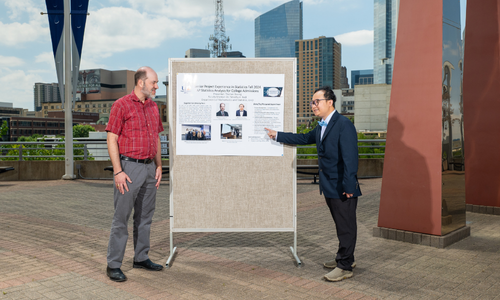Recent UHD graduate Thomas Duong’s success is a testament to perseverance, the UHD faculty’s impact on student outcomes, and how one research project can make a big difference.
A native of Vietnam, Duong attended Houston Community College before transferring to UHD in 2023 and joining UHD’s Scholars Academy. A lot of hard work and one important research project later, Duong is pursuing a Master in Statistics degree at Rice University this fall. His goal is to earn his Ph.D., become a professor in statistics, and continue statistics research in the fields of education, engineering, and biology.
The story of Duong’s senior research project “AP Statistics Analysis for College Admission” is as much about impactful teaching as it is about Impact Learning. After having taught Duong in a class and acting as his Scholar Academy mentor, Dr. Timothy Redl, Professor of Mathematics and Chair for the Department of Mathematics and Statistics, knew of Duong’s interests in statistics and in education and suggested the topic for the research project. Even more importantly, he helped him make connections—not just intellectually but with people and resources, which proved invaluable to the analysis itself.
During his two decades at UHD, Redl has been a faculty research advisor for senior projects in math, statistics, or data science for 37 students. UHD is unique among universities in its emphasis on undergraduate research, a high impact practice coordinated by the Impact Learning Office. That’s because as a teaching institution, UHD sees the importance of learning through research projects.
Redl explains: “As faculty, we're evaluated 50% on our teaching, 25% on scholarship, and 25% on service, so it's made clear to us that teaching is our main goal. The senior projects that we advise are actually counted as teaching in our evaluations and our faculty annual reports.”
“For Math majors, the senior project is a requirement of Math 4395; for Statistics and Data Science majors, it's an option. Those students can either do a senior project or they can just take another course to satisfy that requirement. So, Thomas chose to do a senior project when he could have taken another course.”
Last fall Duong approached Redl to be his advisor for the project. “I thought about something that he could do related to statistics and education,” said Redl. “I knew that UHD did not accept AP statistics for credit, and the university was thinking of revising some of its policies regarding AP credit. So, I suggested to Thomas, ‘Why don't you think about looking at this exam and getting some data on it?’”
“He suggested that I talk with then-Director of Admissions Kristina Raymond and that I reach out to the Texas Education Agency,” said Duong, whose research also included school districts in the area, Texas as a whole, and U.S. data. He looked at how many students take the AP Statistics final exam each year and how many pass, going back several years. He also looked at the exam’s content. Finally, he looked at universities and community colleges in the area to see what AP credits they accepted.
In addition to helping Duong make connections in the research, “Dr. Redl answered any question that I wanted to ask regarding the research and also how to write a formal research paper,” said Duong. Senior research projects typically culminate in a research paper and an oral presentation. But Duong’s project didn’t end there.
With data on his side, Duong recommended that UHD not only accept AP statistics with a score of three or higher on the exam but also give students a specific course for credit: Statistics Literacy. “I just found out a couple weeks ago from Enrollment Management that’s exactly what UHD is going to do,” said Redl. “They took his recommendation and will be honoring a three or better on the AP Stat exam for incoming freshmen and will award them credit for Stat Literacy.”
The real icing on the cake is that Duong’s paper was recently accepted for publication in the Princeton Journal of Interdisciplinary Research with the two as co-authors. That’s the power of impactful teaching, impact learning, and analysis with a purpose: using data-driven research to empower others and make change happen.

